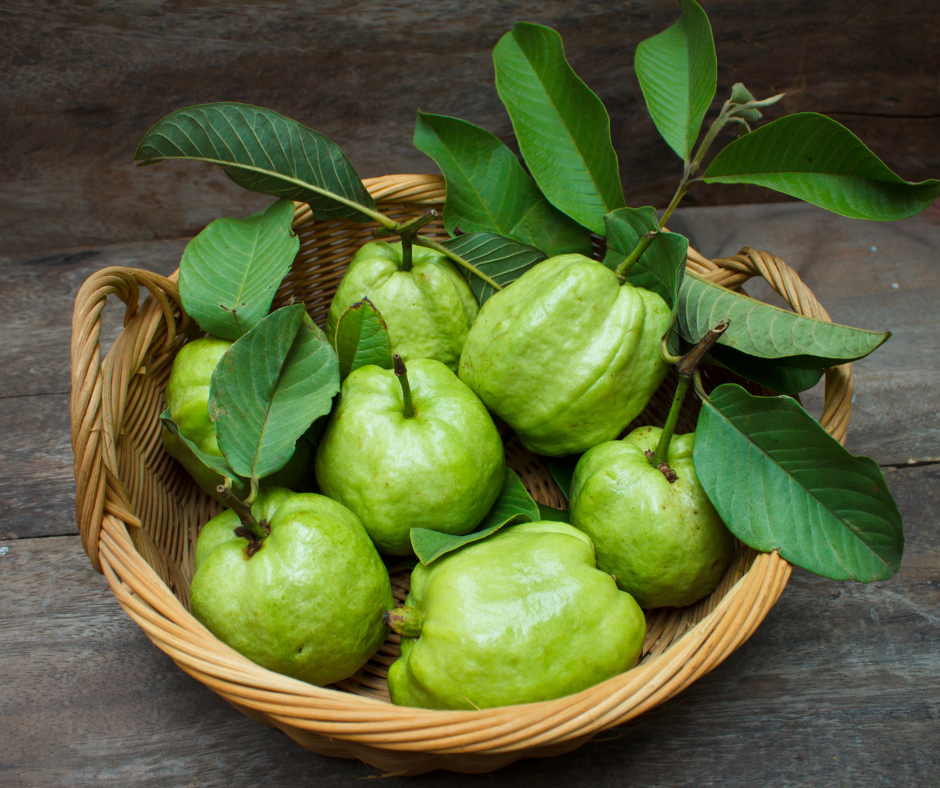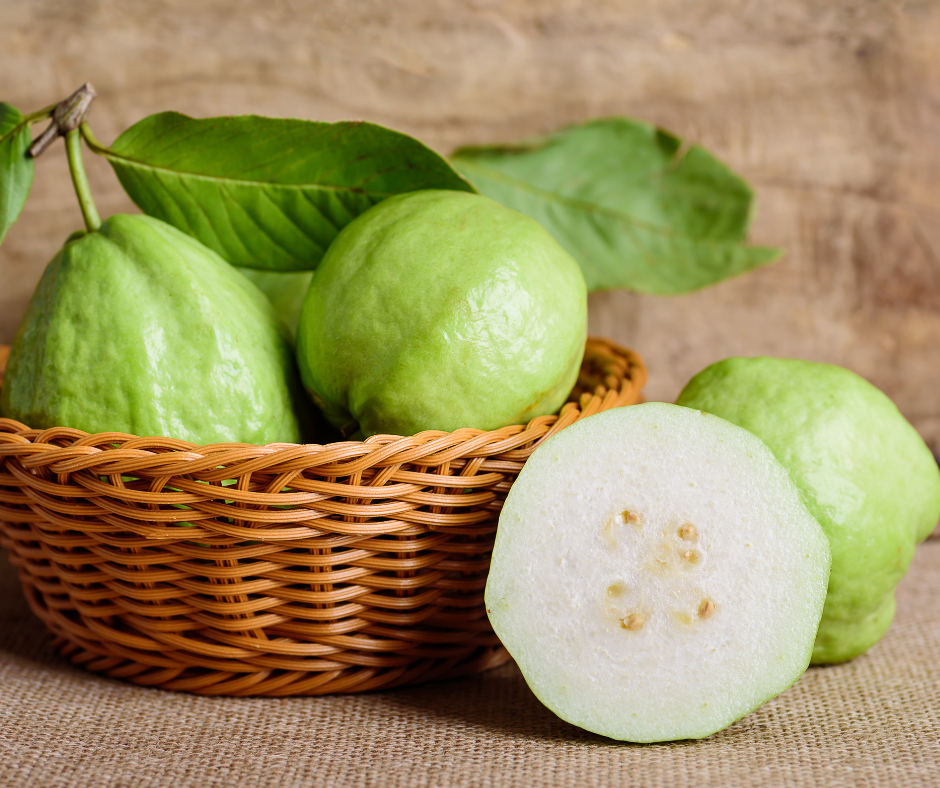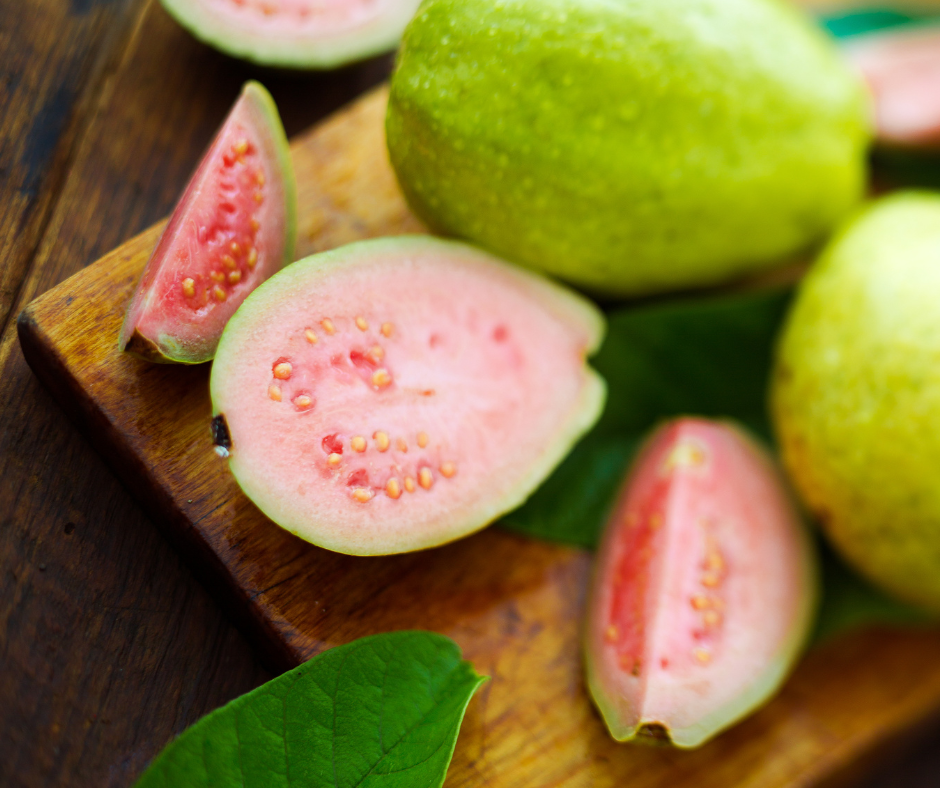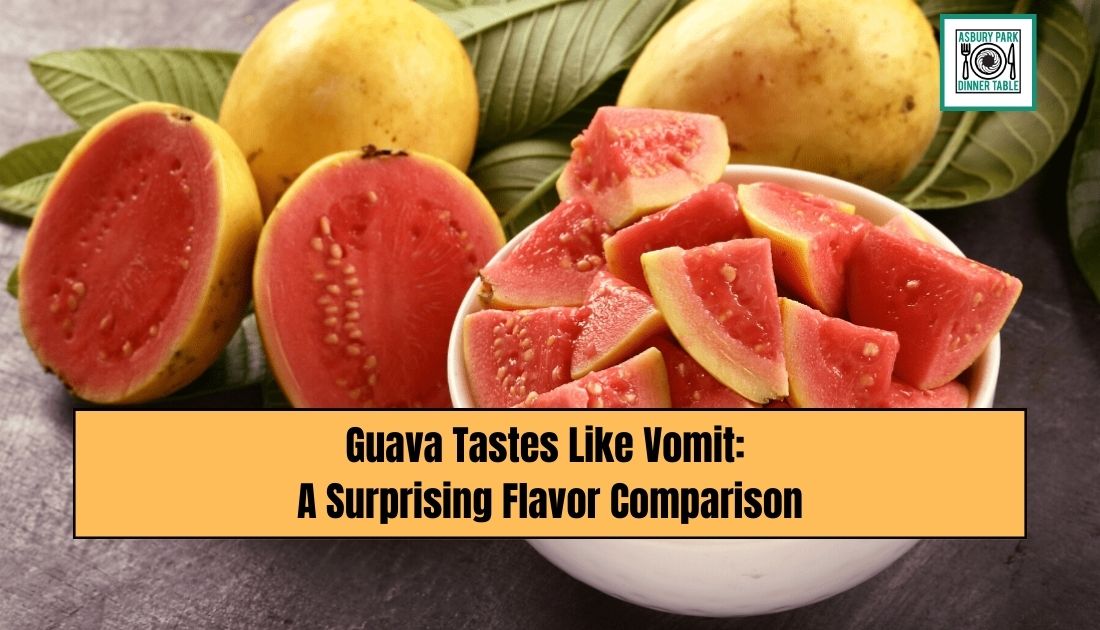Introduction
When it comes to unique and delightful flavors, guava stands out as a tropical fruit that surprises the taste buds. Its taste is often described as a cross between a pineapple and a strawberry, with a hint of pear and passion fruit. However, some people make one unexpected comparison when it comes to the flavor of guava – vomit. This surprising flavor comparison raises questions and curiosity about the taste of guava. This article will explore guava and its flavor expectations and explore the truth behind Guava Tastes Like Vomit.
What Is Guava And Its Flavor Expectations
Guava is a tropical fruit that originated in Central America and is now cultivated in various parts of the world, including India, the leading guava producer. This fruit comes in different varieties, each with its unique flavor profile.
One of the most common varieties is the Lemon Guava, which lives up to its name with its lemony flavor. It is sweet and small, accompanied by a strong scent that adds to its distinctiveness. Another variety, known as the Tropical Pink guava, captivates with its bright yellow skin and pink flesh. It offers a mildly sweet taste and a strong aroma that adds to the tropical experience. The Tropical White guava, with its whitish skin and yellow interior, brings a unique flavor to the table.
As for the overall flavor of guava, it is commonly described as sweet and pleasantly tropical. Combining pineapple and strawberry notes and a pear-like texture creates a unique taste experience that many love. Additionally, some compare guava’s flavor to that of passion fruit. Its natural sweetness is well-balanced, avoiding overpowering sentimental qualities and providing a refreshing and enjoyable flavor.
However, despite the overwhelmingly positive descriptions of guava’s flavor, some people make a surprising comparison – vomit. This unexpected association may leave many wondering how a fruit with such a delightful taste can elicit such an unpleasant comparison. The truth is that taste preferences vary from person to person, and what may be delightful for some may not be for others. It’s also worth noting that smells and flavors can evoke different memories and associations, leading to contrasting interpretations of taste.
In conclusion, guava is a tropical fruit with a unique and enjoyable flavor combining pineapple, strawberry, pear, and passion fruit elements. While it may surprise some with its vomit comparison, it’s important to remember that taste experiences are subjective. Exploring the flavors of guava can be an exciting journey for those seeking new culinary adventures. So, embrace the tropical essence and indulge in the delightful taste of guava.

The Surprising Flavor Of Guava
The Aroma And Taste Of Guava Compared To Other Fruits
When it comes to unique and delightful flavors, guava stands out as a tropical fruit that surprises the taste buds. Its taste is often described as a cross between a pineapple and a strawberry, with a hint of pear and passion fruit. Guava offers a refreshing and enjoyable flavor that many love due to its combination of distinct tropical notes.
Compared to other fruits, guava has unique qualities that set it apart. The aroma of guava is pungent and plant-like, similar to vanilla but much stronger. This intense scent adds to the sensory experience of enjoying this tropical fruit. In terms of taste, guava has a well-balanced natural sweetness, avoiding any overpowering saccharine qualities that some fruits may have. It provides a pleasant burst of flavor that can be described as a hybrid between a strawberry and a pear.
The Unique Qualities That Some Describe Guava Tastes Like Vomit
Despite the overwhelmingly positive descriptions of guava’s flavor, some people make a surprising comparison – vomit. This unexpected association may leave many wondering how a fruit with such a delightful taste can elicit such an unpleasant comparison.
It’s important to note that taste preferences vary from person to person. What may be pleasing to some can be off-putting to others. The comparison of Guava Tastes Like Vomit is subjective and not shared by everyone. It is essential to approach this comparison with an open mind and understand that individual taste perceptions can differ greatly.
Furthermore, it’s worth considering that smells and flavors can evoke different memories and associations. Some individuals may have had negative experiences with certain smells or flavors, leading to contrasting interpretations of taste. It is crucial to remember that these associations are personal and not a reflection of the inherent qualities of guava.
In conclusion, guava is a tropical fruit with a unique and enjoyable flavor combining pineapple, strawberry, pear, and passion fruit elements. While it may surprise some with its vomit comparison, it’s important to remember that taste experiences are subjective. Exploring the flavors of guava can be an exciting journey for those seeking new culinary adventures. So, embrace the tropical essence and indulge in the delightful taste of guava.
Exploring The Science Behind Guava’s Flavor
Guava is a tropical fruit that offers a surprising and delightful flavor experience. To understand the science behind guava’s unique taste, we must dive into the chemical compounds contributing to its distinctive flavor profile. Additionally, we will explore the factors that influence individual perceptions of flavors, shedding light on why some may describe Guava Tastes Like Vomit.
Chemical Compounds Responsible For Guava’s Distinctive Taste
The captivating flavor of guava can be attributed to a combination of chemical compounds that interact with our taste buds. One significant compound, guaiacol, contributes to the spicy aroma reminiscent of vanilla. Guava also contains volatile compounds, such as linalool and geraniol, that add floral and fruity notes to its taste. These compounds combine to create a complex flavor profile that combines the sweetness of fruits like strawberries and pears with a tropical twist.
Another compound in guava is ethyl butanoate, which contributes to the fruit’s sweet and fruity taste. This compound is commonly found in many fruits and gives guava its naturally balanced sweetness, avoiding any cloying or overpowering qualities that some fruits may have. The interaction of these compounds in guava creates a refreshing and enjoyable taste experience.
Factors That Contribute To Individual Perception Of Flavors
Taste preferences are highly subjective and can vary from person to person. Several factors, including genetics, past experiences, and cultural backgrounds, influence this diversity in taste perception. Each individual’s taste receptors may be more or less sensitive to specific compounds, influencing how they perceive flavors.
Memories and associations also play a role in our perception of taste. If someone has had negative experiences associated with certain smells or flavors, it can lead to contrasting interpretations of taste. The comparison of guava to vomit, although not shared by everyone, may be influenced by these individual memories and associations.
Furthermore, cultural differences can shape taste preferences. Some flavors considered pleasant in one culture may be perceived differently in another. It is important to approach discussions about flavor with an open mind and respect for diverse perspectives.
In conclusion, guava’s unique and enjoyable flavor can be attributed to combining chemical compounds such as guaiacol, linalool, geraniol, and ethyl butanoate. However, taste perception is a subjective experience influenced by genetics, past experiences, and cultural backgrounds. While the vomit comparison may seem surprising to some, it is crucial to remember that taste experiences vary from person to person. Exploring the flavors of guava can be an exciting journey for those seeking new culinary adventures, so embrace the tropical essence and indulge in the delightful taste of guava.

Guava Varieties And Flavor Profiles
Guava is a fruit that is known for its unique and delightful flavor. However, it is important to note that not all guavas taste the same. There are different varieties of guava, each with its distinct flavor profile. Understanding the different types of guava and their flavor characteristics can help you choose the variety that best suits your taste preferences.
Different Types Of Guava And Their Flavor Characteristics
Guava varieties can vary in taste, color, and texture. Some of the most common varieties include strawberry guava and lemon guava. Strawberry guava, as the name suggests, has a flavor that resembles strawberries. It offers a sweet and slightly tart taste that is refreshing and enjoyable. On the other hand, lemon guava has a citrusy-leaning taste, with hints of lemon in its flavor profile.
Apart from these popular varieties, other guava cultivars offer unique flavors. Some guavas taste sweeter, while others may have a more sour or tangy flavor. The fruit’s sweetness depends on the guava you are eating. It is worth mentioning that some cultivars are creamier than others, offering a smooth and rich texture that is reminiscent of tropical peanut butter.
Comparing Flavors Of Guava Varieties To Understand Preferences
Taste preferences can vary from person to person, and what one person may enjoy, another may find unappealing. When it comes to guava, some individuals may describe its flavor as pleasant, while others say Guava Tastes Like Vomit. It is important to note that taste perception is subjective and influenced by various factors such as genetics, past experiences, and cultural backgrounds.
While the vomit comparison may seem surprising to some, it is crucial to remember that taste experiences differ from person to person. Individual memories and associations may influence the association between guava and vomit. It is essential to approach discussions about flavor with an open mind and respect for diverse perspectives.
Exploring the flavors of different guava varieties can be an exciting culinary adventure. By tasting different types of guava, you can discover your preferred flavor profiles and find the variety that suits your taste buds the best. Whether you enjoy the sweetness of strawberry guava or the tanginess of lemon guava, experimenting with different guava cultivars can add a refreshing twist to your palate.
In conclusion, guava varieties offer a range of flavor profiles, from sweet and tropical to citrusy and tangy. Each guava variety has its unique characteristics that contribute to its distinct taste. Taste perception may differ from person to person, influenced by genetics, past experiences, and cultural backgrounds. Regardless of individual preferences, exploring the flavors of guava can be a delightful and rewarding experience for those seeking new culinary adventures.
Overcoming The Vomit Perception
While guava is generally known for its unique and delightful flavor, it is common to come across individuals who describe its taste as reminiscent of vomit. This surprising flavor comparison can be off-putting and may discourage some from enjoying this tropical fruit. However, it is important to approach discussions about flavor with an open mind and respect for diverse perspectives. Here are some tips for enjoying guava’s flavor and overcoming negative associations:
Tips For Enjoying Guava’s Flavor And Overcoming Negative Associations
- Consider the source: Taste perception is subjective and can vary from person to person. Individual memories and associations may influence the association between guava and vomit. Remember that just because one person negatively describes the taste does not mean everyone will have the same experience.
- Try different varieties: Guava comes in various types, each with its unique flavor profile. Experiment with different varieties, such as strawberry or lemon guava, to find the one that best suits your taste buds. You might discover that certain varieties have a more appealing flavor that outweighs any negative associations.
- Pair it with complementary flavors: Sometimes, the taste of guava can be enhanced by pairing it with other ingredients that complement its flavor. Add guava to salads, smoothies, or desserts, where combining flavors can create a more enjoyable eating experience.
- Balance of sweetness and tanginess: Guava has a delicate balance that can be appreciated when the flavors are in harmony. If you find the taste overwhelming, try adjusting the balance by adding a squeeze of lime or a sprinkle of salt to offset the sweetness.
Recipes And Pairings That Enhance Guava’s Taste And Uniqueness
To fully appreciate the flavors of guava and bring out its unique characteristics, here are some recipe ideas and pairings that can enhance its taste:
- Guava Cheesecake: The creamy richness of cheesecake pairs beautifully with the sweetness of guava. Combining the two creates a luscious dessert that showcases the fruit’s tropical essence.
- Guava Margarita: Mix guava juice or puree with tequila, lime juice, and simple syrup to create a refreshing and vibrant cocktail. The tanginess of the lime balances the sweetness of the guava, resulting in a well-rounded and tropical drink.
- Guava Salad: Combine fresh guava slices with mixed greens, goat cheese, and a citrus vinaigrette. The combination of flavors creates a delicious and refreshing salad, highlighting the fruit’s unique taste.
- Guava BBQ Sauce: Use guava puree as a base for a tangy and slightly sweet barbecue sauce. The guava flavors complement grilled meats and add a tropical twist to traditional barbecue dishes.
By exploring different guava varieties, experimenting with pairings, and trying out recipes that enhance its flavor, you can overcome any negative associations and discover the delightful taste of this tropical fruit. Remember, taste perception is subjective; each individual may have a unique guava flavor experience. Embrace the opportunity for culinary adventure and enjoy the diverse flavors of guava.

Conclusion
Now you should know about the topic of Guava Tastes Like Vomit. Despite the surprising comparison of guava’s taste to vomit, it is important to approach discussions about flavor with an open mind and respect for diverse perspectives. Taste perception is subjective, and while some may find guava’s flavor delightful, others may have a different experience. It is crucial to appreciate guava for its unique flavor and versatility.
Appreciating Guava For Its Unique Flavor And Versatility
While comparing guava’s taste to vomit may discourage some from enjoying this tropical fruit, exploring and appreciating its distinct flavor profile is essential. Guava offers a harmonious balance of sweetness and tanginess, with tropical fruit notes and nuances that make it truly special. Its flavors can be enhanced by pairing it with complementary ingredients or adjusting the balance of sweetness and tanginess.
There are various ways to showcase guava’s taste and uniqueness. Recipes such as guava cheesecake, guava margarita, guava salad, and guava BBQ sauce can bring out the fruit’s tropical essence and create delightful culinary experiences. By exploring different guava varieties and experimenting with pairings, individuals can discover the flavors that appeal to their taste buds.
Embracing Diversity In Taste Preferences
It is important to remember that taste perception is subjective, and each individual may have a unique experience with guava’s flavor. The association between guava and vomit is influenced by personal memories and associations, which can vary from person to person. Just because one person negatively describes the taste does not mean everyone will have the same experience.
Embracing diversity in taste preferences allows for a more inclusive and understanding approach to food. Different people have different tastes, and that should be celebrated. Instead of dismissing guava based on one comparison, individuals can explore its flavors and form opinions.
In conclusion, while comparing guava’s taste to vomit may be surprising and off-putting to some, it is important to approach discussions about flavor with an open mind. Guava offers a unique and versatile taste profile that can be appreciated in various ways. By embracing diversity in taste preferences, individuals can discover the delightful flavors of guava. So, why not try guava and see what it tastes like?
FAQ: Guava Tastes Like Vomit: A Surprising Flavor Comparison
Q: Why does my guava taste like vomit?
A: There could be various reasons why your guava tastes unpleasant. One possibility is that you may have a specific variety of guava with a flavor profile reminiscent of vomit. However, it’s also important to note that taste is subjective, and what may be unpleasant for one person could be enjoyable for another. Factors such as soil quality, growing conditions, and fruit ripeness can influence guava’s taste.
Q: Is it normal for guava to have a vomit-like flavor?
A: No, it is not normal for guava to have a vomit-like flavor. Most guava varieties are known for their sweet, tropical taste with a hint of tanginess. However, taste preferences vary, and some may perceive certain flavors differently. If you find the guava you have tasted unpleasant, it could be due to a specific variety or individual taste sensitivity.
Q: Can the power of suggestion affect the taste perception of guava?
A: Yes, the power of suggestion can influence how we perceive flavors. If you have been told or read that guava tastes like vomit, your mind may be influenced to expect a similar taste. Sensory perceptions and cognitive factors shape our taste experiences, so it’s important to approach tasting with an open mind.
Q: What can I do if my guava tastes unpleasant?
A: If you find the taste of your guava unpleasant, you can try a few things. First, ensure that the guava is ripe before consuming it. The ripeness affects both the flavor and texture of the fruit. Also, try different guava varieties, as their taste can vary significantly. If you consistently find guavas to have an undesirable taste, you may want to explore other tropical fruits you enjoy more.
Q: Can guava taste like other fruits or have off-flavors?
A: While guava is typically described as having a unique sweet and tangy flavor, individual taste perceptions can differ. Some people may compare the taste of guava to citrus fruits or papaya. In rare cases, certain guava varieties can have off-flavors that may be unappealing to some. If you are not fond of the taste of guava, it’s worth exploring other tropical fruits to find ones that suit your preferences better.
Please note that the information provided is based on online data and should not be considered professional advice. If you have concerns about the taste or quality of your guava, it’s always best to consult with a horticulturist or an expert in tropical fruits for accurate guidance.

